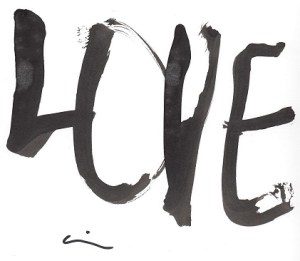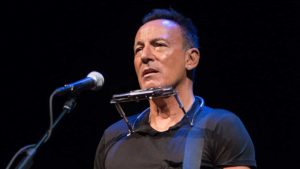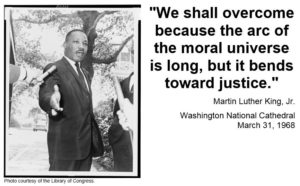Justice & Mercy
Center for Action
Bryan Stevenson (b. 1959) is a lawyer, social justice activist, and founder of the Equal Justice Initiative and the National Memorial for Peace and Justice in Montgomery, Alabama. [1] In his book Just Mercy, Stevenson describes how being in touch with our own humanity and need for mercy helps give us the compassion needed for restorative justice. He is a real contemporary hero for many of us at the Center for Action and Contemplation.
My years of struggling against inequality, abusive power, poverty, oppression, and injustice had finally revealed something to me about myself. Being close to suffering, death, executions, and cruel punishments didn’t just illuminate the brokenness of others; in moments of anguish and heartbreak, it also exposed my own brokenness. You can’t effectively fight abusive power, poverty, inequality, illness, oppression, or injustice and not be broken by it. . . .
I guess I’d always known but never fully considered that being broken is what makes us human. We all have our reasons. Sometimes we’re fractured by the choices we make; sometimes we’re shattered by things we would never have chosen. But our brokenness is also the source of our common humanity, the basis for our shared search for comfort, meaning, and healing. Our shared vulnerability and imperfection nurtures and sustains our capacity for compassion.
We have a choice. We can embrace our humanness, which means embracing our broken natures and the compassion that remains our best hope for healing. Or we can deny our brokenness, forswear compassion, and, as a result, deny our own humanity. . . .
So many of us have become afraid and angry. We’ve become so fearful and vengeful that we’ve thrown away children, discarded the disabled, and sanctioned the imprisonment of the sick and the weak—not because they are a threat to public safety or beyond rehabilitation but because we think it makes us seem tough, less broken. I thought of the victims of violent crime and the survivors of murdered loved ones, and how we’ve pressured them to recycle their pain and anguish and give it back to the offenders we prosecute. I thought of the many ways we’ve legalized vengeful and cruel punishments, how we’ve allowed our victimization to justify the victimization of others. We’ve submitted to the harsh instinct to crush those among us whose brokenness is most visible.
But simply punishing the broken—walking away from them or hiding them from sight—only ensures that they remain broken and we do, too. There is no wholeness outside of our reciprocal humanity.
Embracing our brokenness creates a need for mercy. I began thinking about what would happen if we all just acknowledged our brokenness, if we owned up to our weaknesses, our deficits, our biases, our fears. Maybe if we did, we wouldn’t want to kill the broken among us who have killed others. Maybe we would look harder for solutions to caring for the disabled, the abused, the neglected, and the traumatized. We could no longer take pride in mass incarceration, in executing people, in our deliberate indifference to the most vulnerable.
Bruce
In response to requests for the text of Bruce’s remarks before he performed “The Ghost of Tom Joad” last night, here is a rough transcript:
I never believed that people come to my shows, or rock shows to be told anything.
But I do believe that they come to be reminded of things. To be reminded of who they are, at their most joyous, at their deepest, when life feels full. It’s a good place to get in touch with your heart and your spirit, to be amongst the crowd. And to be reminded of who we are and who we can be collectively. Music does those things pretty well sometimes, particularly these days when some reminding of who we are and who we can be isn’t such a bad thing.
That weekend of the March for our Lives, we saw those young people in Washington, and citizens all around the world, remind us of what faith in America and real faith in American democracy looks and feels like. It was just encouraging to see all those people out on the street and all that righteous passion in the service of something good. And to see that passion was alive and well and still there at the center of the beating heart of our country.
It was a good day, and a necessary day because we are seeing things right now on our American borders that are so shockingly and disgracefully inhumane and un-American that it is simply enraging. And we have heard people in high position in the American government blaspheme in the name of God and country that it is a moral thing to assault the children amongst us. May God save our souls.
There’s the beautiful quote by Dr. King that says the arc of the moral universe is long but it bends toward justice. Now, there have been many, many days of recent when you could certainly have an argument over that. But I’ve lived long enough to see that in action and to put some faith in it. But I’ve also lived long enough to know that arc doesn’t bend on its own. It needs all of us leaning on it, nudging it in the right direction day after day. You gotta keep, keep leaning.
I think it’s important to believe in those words, and to carry yourself, and to act accordingly. It’s the only way that we keep faith and keep our sanity.
I’ve played this show 146 nights with basically the same setlist, but tonight calls for something different…
– Bruce Springsteen
Symmetry




Leave a Reply